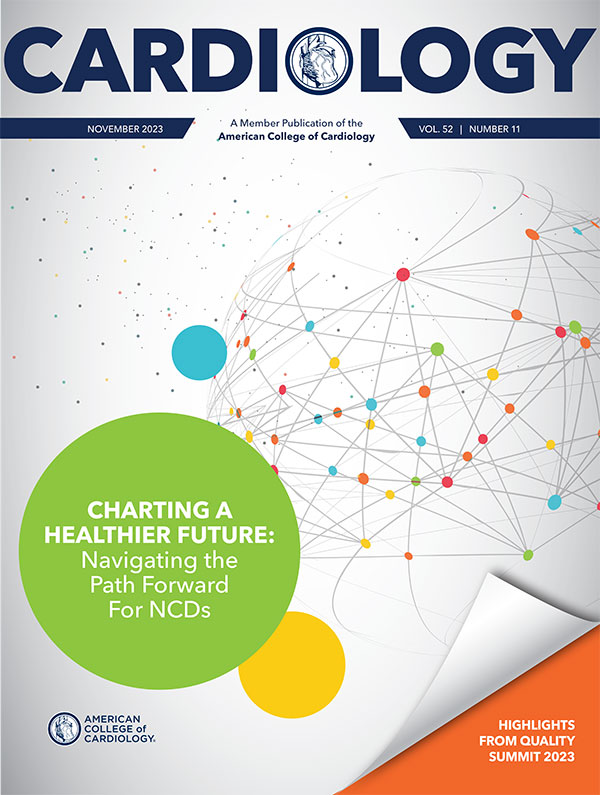Heart of Health Policy | Engage, Advocate and Influence: Your ACC Takes to Capitol Hill

More than 400 cardiovascular clinicians from across the U.S. took part in ACC's 2023 Legislative Conference in Washington, DC, from Oct. 15-17, where issues like protecting clinician well-being, improving heart health for all, and increasing access to cardiovascular care were the focus of the three-day agenda.
In addition to opportunities to network with fellow advocates, conference participants were able to take part in issue briefings and educational sessions featuring political experts and ACC leaders. They then had the unique opportunity to meet with more than 300 members of Congress and/or their staff to share first-hand perspectives on cardiovascular care delivery in the U.S. and ask for support on key legislation.
Check out the following key takeaways and asks that were the focus of this year's congressional meetings. Learn how you can further support and amplify these messages at ACC.org/Advocacy.
Streamlining Prior Authorization Practices
The ACC supports the following list of prior authorization (PA) principles developed by an American Medical Association-led coalition that are centered around transparency, standardization and efficiency:
- Define "selective application of PA" to mean review and authorization for coverage of a test or treatment where appropriate for requests not covered by published clinical guidance.
- Prohibit procedure and medication substituting by payers consistent with Appropriate Use Criteria and guidelines.
- Allow for "prior authorization program review and volume adjustment," so payers and contracted benefit managers can authorize requests for tests and treatments from providers or practices that demonstrate compliance with established published clinical guidance.
- Require payers to make rates of allowed and denied procedures available to consumers.
- Avoid interruption in care by allowing patients granted coverage for a given treatment or medication under one payer to transfer that coverage to another payer.
- Establish online standardized PA tools and criteria for providers and their practice staff.
Co-sponsor and support the bipartisan Getting Over Lengthy Delays in Care As Required by Doctors (GOLD Card) Act (H.R. 4968), introduced by Reps. Michael Burgess, MD, (R-TX) and Vicente Gonzalez (D-TX), to exempt qualifying clinicians from PA requirements under Medicare Advantage plans.
Expanding Patient Access to CV Care
The ACC has long supported expanding access to cardiovascular and pulmonary rehabilitation services. Cardiac rehabilitation is a medically supervised program that includes exercise training, education on heart healthy living and counseling. For patients with cardiovascular disease, these programs are proven to reduce the risk of a future cardiac event, reduce all-cause mortality by 25%, decrease hospitalizations and the use of medical resources, and improve health-related quality of life. Expanding the cardiac care team's ability to order these services expands access to care for the patients who need it, particularly those who reside in rural and underserved areas.
Co-sponsor and support the Increasing Access to Quality Cardiac Rehabilitation Act of 2023 (H.R. 2583), introduced by Reps. Lisa Blunt Rochester (D-DE) and Adrian Smith (R-NE), which would expand the ability of the cardiac care team (PAs, NPs, CNSs) to order cardiac and pulmonary rehabilitation services beginning in 2024.
Increase Community Access to AEDs
Through legislation like the Access to AEDs Act, Congress can reduce sudden cardiac arrest among young athletes and their communities. The inability of a school to purchase or maintain an AED should not be a barrier to the availability of this lifesaving tool. This legislation also ensures that schools will adhere to best practices by requiring any heart health screening programs for student athletes to be consistent with ACC and American Heart Association guidelines.
Co-sponsor and support the Access to AEDs Act of 2023 (H.R. 2370/S. 1024), introduced by Reps. Sheila Cherfilus-McCormick (D-FL) and Bill Posey (R-FL) in the U.S. House and Sens. Cory Booker (D-NJ) and Richard Blumenthal (D-CT) in the U.S. Senate.
Reduce Unnecessary Amputations
Amputation can result in additional health concerns, reduced quality of life and in some cases, life-threatening conditions. Many peripheral artery disease-related amputations could be avoided through early diagnosis and attention to the condition, allowing clinicians to pursue aggressive risk factor modification, supervised exercise programs and surveillance studies. The ACC played a key role in helping to craft the Amputation Reduction and Compassion (ARC) Act by responding to requests for information, participating in briefings and taking part in the press conference celebrating the bill's introduction. This legislation marks a step forward in efforts to reduce health disparities and achieve health equity for patients in need of cardiovascular care.
Co-sponsor and support the ARC Act (H.R. 4261), introduced by Reps. Donald Payne (D-NJ), Jeff Van Drew (R-NJ), Ruben Gallego (D-AZ) and Chris Smith (R-NJ).
Strengthening Medicare For Patients and Clinicians
Significant reductions in physician payment for Medicare services and lack of inflationary updates exacerbate financial uncertainty for medical practices and threaten patient access to care. The ACC urges Congress to work with the College and the broader medical community to create sustainable and long-term solutions to the system and ensure clinicians can focus on providing high-quality patient care. Providing annual updates tied to inflation is a crucial step in creating a more stable system for both clinicians and patients.
Co-sponsor and support the Strengthening Medicare for Patients and Providers Act (H.R. 2474), introduced by Reps. Larry Bucshon, MD, (R-IN) and Raul Ruiz, MD, (D-CA). Click here to send your message.
Want More Legislative Conference Highlights?
Check out more highlights from this year's conference on social media by following #ACCLegConf and #ACCAdvocacy and tagging @ACCinTouch to add to health policy conversations, including those about increasing access to patient care, safeguarding clinician well-being and the workforce pipeline, and improving heart health for all. You can view the meeting agenda, conference resources, photo library and more on ACC.org/LegislativeConference. Don't forget to save the date for next year's conference, taking place Sept. 29 to Oct. 1, in Washington, DC.
ACC's Long-Term Vision For Optimal CV Care
As the stewards of cardiovascular patients, the ACC is committed to developing and advancing solutions that will optimize the delivery of cardiovascular care, increase access to care, and improve patient outcomes and health. However, significant reforms are necessary within the current Medicare system to achieve this vision.
Decisive action can help keep practices in business and bolster the nation's physician pipeline for the future. The ACC recommends securing financial stability in the Physician Fee Schedule (PFS) Payment System with baseline positive inflationary updates, along with eliminating the $20 million budget neutrality requirement within the PFS and recognizing the negative impact reduced resources has on equitable access to care and patient outcomes. Other long-term reforms supported by the ACC include actions to ensure all patients have access to high-quality cardiovascular care, involve patients in care decisions and support clinicians in providing value-based care.
Learn how the ACC is leading the charge to transform care delivery and how you can get involved at ACC.org/OptimizeCVCare.
Keywords: ACC Publications, Cardiology Magazine, Prior Authorization, Health Policy, Health Workforce, ACC Advocacy
< Back to Listings


